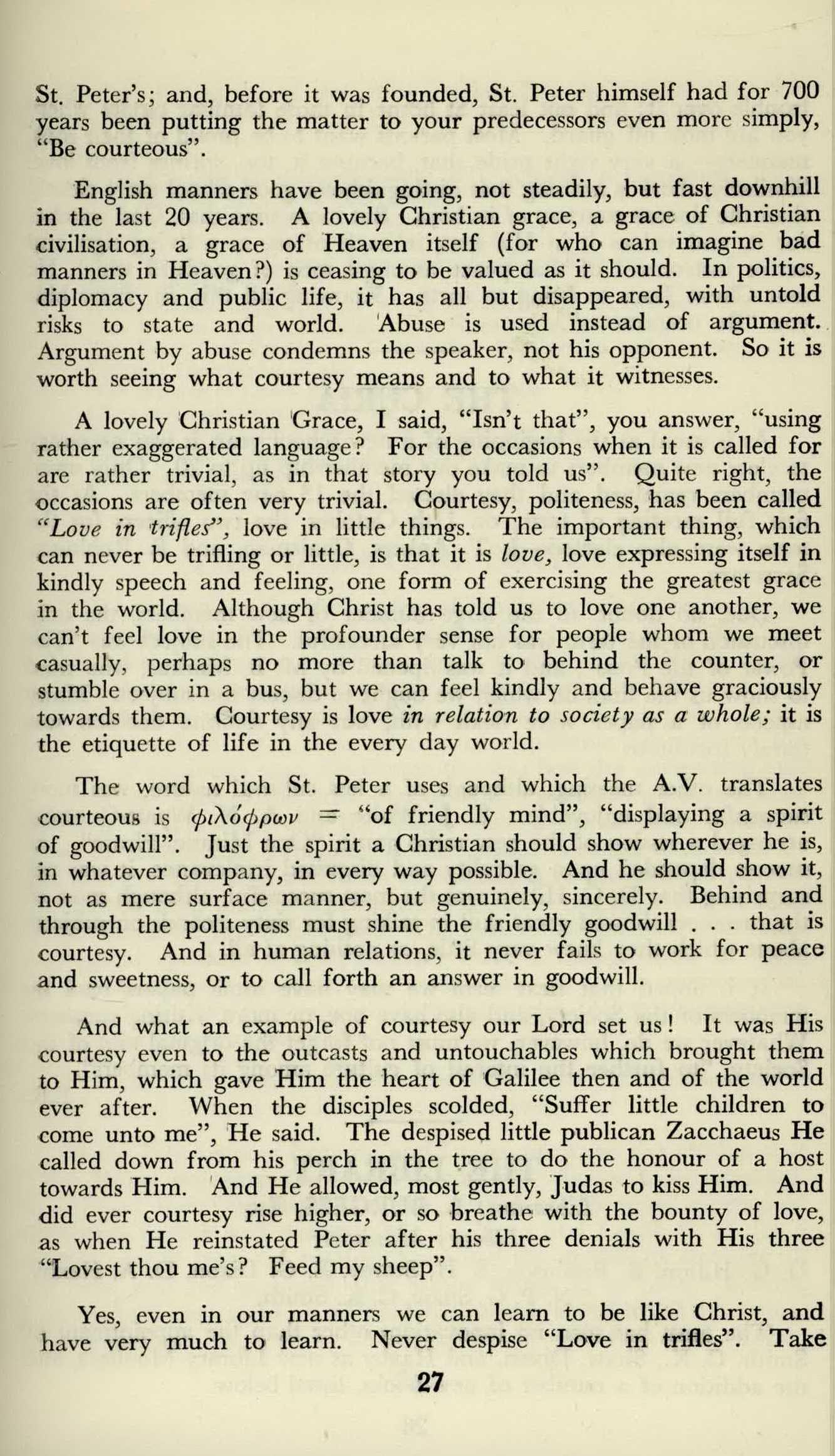
4 minute read
`Be Courteous'
from Jan 1952
by StPetersYork
of the leading treble's initial solo to sharpen. Considering the number and variety of musical programmes sung by its members during the week, the numerous rehearsals, two concerts and Junior Carols, the Choir's singing was, on the whole, remarkably good, but even a momentary tiredness of voice soon vanished at the Choir supper which followed.
m.J.Q-
BE COURTEOUS
(The following is the text of the sermon preached by the Dean of York in Chapel on Sunday, the 28th October. The address was found so helpful by the congregation that, with the Dean's permission, we publish it for a wider audience.)
Here is excellent advice from your own St. Peter, Ch. 3, v. 8 in his Epistle.
Finally, be ye all of one mind, be sympathetic, love as brethren, be pitiful, be courteous
All qualities, you will notice, which are departments, facets, aspects of the master grace of Love. Tonight I am moved to speak about one only of them, because of an incident which happened in Stonegate during the week.
A colonel, now retired, well-known in York both for his past military service and his delightful personality, as he was getting out of his car, dropped a half-crown. As you might expect, it did not stop conveniently on the pavement, but rolled away just, only just, under his dashboard. He stooped to recover it, but old wounds and the stiffness of age, made it just too difficult for him to reach. A young man, well dressed, passed by at that moment; and the Colonel asked with his wonted politeness if he would oblige by picking up the coin for him. The young man took a look at it and said, "I can't be bothered", and walked on.
Behaviour of that sort, were you to see it, would fill you, I know, with disgust. As it did me. Yet someone may say "Grossly bad manners, I admit, but only bad manners". Only bad manners? Bad manners reveal much more than themselves. What that young man did by his bad manners, and most effectively, was to advertise how odious a person he was I Similarly, good manners are much more than mere manners, they reveal the inward character of the person who exercises them. Courtesy is a window into a man, which everyone he meets can look into.
One of the oldest and most famous of English schools has as its motto "Manners makyth man". Winchester, however, isn't as old as 26
St. Peter's; and, before it was founded, St. Peter himself had for 700 years been putting the matter to your predecessors even more simply, "Be courteous".
English manners have been going, not steadily, but fast downhill in the last 20 years. A lovely Christian grace, a grace of Christian civilisation, a grace of Heaven itself (for who can imagine bad manners in Heaven?) is ceasing to be valued as it should. In politics, diplomacy and public life, it has all but disappeared, with untold risks to state and world. Abuse is used instead of argument. Argument by abuse condemns the speaker, not his opponent. So it is worth seeing what courtesy means and to what it witnesses.
A lovely Christian 'Grace, I said, "Isn't that", you answer, "using rather exaggerated language? For the occasions when it is called for are rather trivial, as in that story you told us". Quite right, the occasions are often very trivial. Courtesy, politeness, has been called "Love in trifles", love in little things. The important thing, which can never be trifling or little, is that it is love, love expressing itself in kindly speech and feeling, one form of exercising the greatest grace in the world. Although Christ has told us to love one another, we can't feel love in the profounder sense for people whom we meet casually, perhaps no more than talk to behind the counter, or stumble over in a bus, but we can feel kindly and behave graciously towards them. Courtesy is love in relation to society as a whole; it is the etiquette of life in the every day world.
The word which St. Peter uses and which the A.V. translates courteous is sbdt4pcov = "of friendly mind", "displaying a spirit of goodwill". Just the spirit a Christian should show wherever he is, in whatever company, in every way possible. And he should show it, not as mere surface manner, but genuinely, sincerely. Behind and through the politeness must shine the friendly goodwill .. . that is courtesy. And in human relations, it never fails to work for peace and sweetness, or to call forth an answer in goodwill.

And what an example of courtesy our Lord set us ! It was His courtesy even to the outcasts and untouchables which brought them to Him, which gave Him the heart of Galilee then and of the world ever after. When the disciples scolded, "Suffer little children to come unto me", He said. The despised little publican Zacchaeus He called down from his perch in the tree to do the honour of a host towards Him. And He allowed, most gently, Judas to kiss Him. And did ever courtesy rise higher, or so breathe with the bounty of love, as when He reinstated Peter after his three denials with His three "Lovest thou me's? Feed my sheep".
Yes, even in our manners we can learn to be like Christ, and have very much to learn. Never despise "Love in trifles". Take










